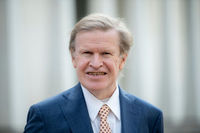Project Description
Finance plays a key role in the story of the history of capitalism, because financial institutions involve a degree of organization that serves to camouflage or obscure the market process. The extent of financialization can be measured; but often the growth in scale of financial institutions means a camouflaging or even suppression of basic market signals. Banks, which are at the center of finance capitalism, have consequently puzzled many observers. They are conceptually a black box, in which the outsider – the depositor – does not really know much about how his money is being used; consequently, they are subject to panics and runs as some depositors change their opinion and come to believe that their funds may not be safe, and as other depositors realize that the fact of a run means that all liabilities cannot be paid and that it is advantageous to be first in line to make a withdrawal. Modern banks have increased their complexity, and hence their intransparency. In the recent financial crisis, observers were astonished to find that in a panic, price signals no longer operated to clear markets, and that it was impossible to determine the worth of complex derivative products. This study will emphasize the way capitalism – especially financial capitalism – depends on often intransparent clusters and networks. These develop in particular locations – capitalist hubs – but depend on technologies that extend the influence widely – even globally. The study showcases particular examples of key figures in social and financial networks, emphasizing linkages between finance and other activities, including artistic patronage and politics. How do the practitioners of an activity that depends on undisclosed and non-public information convince others of their competence and probity: through political activity, artistic or religious practice, or even skill at nonfinancial strategic games, from chess to bridge to Tai Chi.
Personal Bio
Harold James, the Claude and Lore Kelly Professor in European Studies at Princeton University, is Professor of History and International Affairs at the Woodrow Wilson School, and an associate at the Bendheim Center for Finance. His books include a study of the interwar depression in Germany, The German Slump (1986); an analysis of the changing character of national identity in Germany, A German Identity 1770-1990 (1989); International Monetary Cooperation Since Bretton Woods (1996), and The End of Globalization (2001). He was also coauthor of a history of Deutsche Bank (1995), which won the Financial Times Global Business Book Award in 1996, and he wrote The Deutsche Bank and the Nazi Economic War Against the Jews (2001). His most recent books include Family Capitalism, Harvard University Press, 2006; The Creation and Destruction of Value: The Globalization Cycle, Harvard University Press, 2009; Making the European Monetary Union, Harvard University Press, 2012; The Euro and the Battle of Economic Ideas (with Markus K. Brunnermeier and Jean-Pierre Landau), Princeton University Press, 2016; Making A Modern Central Bank: The Bank of England 1979-2003, Cambridge University Press 2020; The War of Words: A Glossary of Globalization, Yale University Press 2021. In 2004 he was awarded the Helmut Schmidt Prize for Economic History, and in 2005 the Ludwig Erhard Prize for writing about economics. He writes a monthly column for Project Syndicate.


